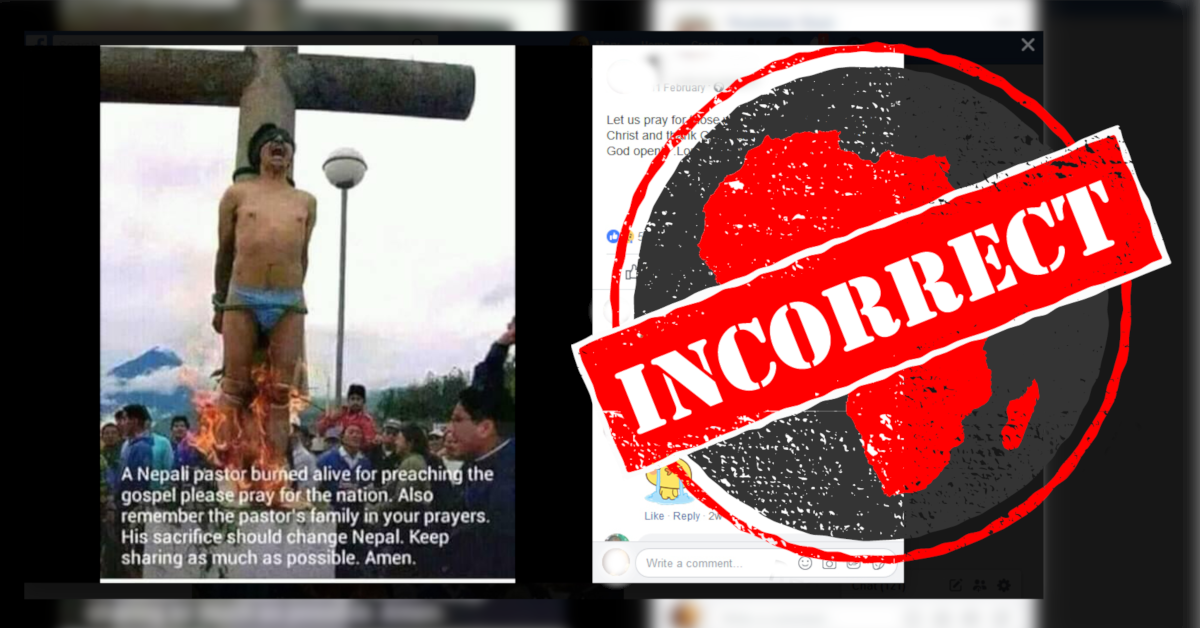Was a preacher put to fire in Nepal, the birthplace of Gautama Buddha, the founder of Buddhism? According to a meme shared on Facebook, a pastor was “burned alive for preaching the gospel” in Nepal.
The South African who posted it wrote: “Let us pray for those who suffer for the gospel of Christ and thank God that we are able to worship God openly. Lord have mercy upon the killers.”

According to the myth-busting website wafflesatnoon, the image has been circulating online for years, sometimes with the claim the “pastor” was burned as a result of Sharia, Islamic law.
The photo is real, but seems to have nothing to do with religion. According to a UK Daily Mail article from October 2006, it’s actually a photo from Pelileo Grande in the South American country of Ecuador.
“A suspected thief screams as villagers set fire to his legs after stripping him and tying him to a cross in Pelileo Grande, Ecuador, 75 miles south of Quito,” the article says.
“Mario Quishpe had been caught stealing and locals took summary justice. A priest, along with other villagers, extinguished the flames and he was taken to hospital where his burns were treated.”
But the Daily Mail may not be the most trustworthy source of facts. So Africa Check looked for other evidence.
A closer look at a clearer version of the image – used in the Daily Mail article – shows a smoking volcano in the background, to the left. And the Ecuadorian town of Pelileo lies just north of an active volcano called Tungurahua.
Tungurahua looks a lot like the volcano in the meme. And Google Street View images show the view of the volcano from the town is almost identical, including a rising ridge between the mountain and Pelileo.
More than that, the overcast sky and greenery shown in the meme fit the climate of Pelileo. – Africa Check (27/02/19)
The South African who posted it wrote: “Let us pray for those who suffer for the gospel of Christ and thank God that we are able to worship God openly. Lord have mercy upon the killers.”

Daily Mail claims photo from Ecuador, South America
According to the myth-busting website wafflesatnoon, the image has been circulating online for years, sometimes with the claim the “pastor” was burned as a result of Sharia, Islamic law.
The photo is real, but seems to have nothing to do with religion. According to a UK Daily Mail article from October 2006, it’s actually a photo from Pelileo Grande in the South American country of Ecuador.
“A suspected thief screams as villagers set fire to his legs after stripping him and tying him to a cross in Pelileo Grande, Ecuador, 75 miles south of Quito,” the article says.
“Mario Quishpe had been caught stealing and locals took summary justice. A priest, along with other villagers, extinguished the flames and he was taken to hospital where his burns were treated.”
Volcano evidence of photo’s location
But the Daily Mail may not be the most trustworthy source of facts. So Africa Check looked for other evidence.
A closer look at a clearer version of the image – used in the Daily Mail article – shows a smoking volcano in the background, to the left. And the Ecuadorian town of Pelileo lies just north of an active volcano called Tungurahua.
Tungurahua looks a lot like the volcano in the meme. And Google Street View images show the view of the volcano from the town is almost identical, including a rising ridge between the mountain and Pelileo.
More than that, the overcast sky and greenery shown in the meme fit the climate of Pelileo. – Africa Check (27/02/19)
Republish our content for free
For publishers: what to do if your post is rated false
A fact-checker has rated your Facebook or Instagram post as “false”, “altered”, “partly false” or “missing context”. This could have serious consequences. What do you do?
Click on our guide for the steps you should follow.
Publishers guideAfrica Check teams up with Facebook
Africa Check is a partner in Meta's third-party fact-checking programme to help stop the spread of false information on social media.
The content we rate as “false” will be downgraded on Facebook and Instagram. This means fewer people will see it.
You can also help identify false information on Facebook. This guide explains how.



Add new comment